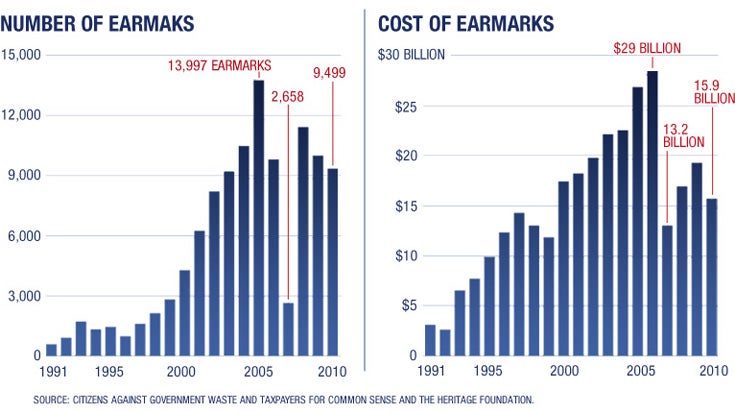One week after Donald Trump won the presidency on a promise to “drain the swamp” in Washington, House Republicans will vote on a proposal to bring back earmarks.
The vote will take place Wednesday when House Republicans meet to adopt their rules for the next Congress. The House earmark ban dates to 2010 when the GOP won control of the chamber.
>>> UPDATE: Conservatives Criticize House GOP Plan to Bring Back Earmarks
Now, a trio of Republican lawmakers wants to return to the practice of earmarking, which became synonymous with government waste and pork-barrel spending during the GOP-controlled Congress of the early 2000s.
Reps. John Culberson of Texas, Mike Rogers of Alabama, and Tom Rooney of Florida are listed as sponsors of the amendment, a copy of which was obtained by The Daily Signal.
The amendment would bring back legislative earmarks for some government agencies, including the Department of Defense, the Army Corps of Engineers, the Department of Homeland Security, and the Bureau of Reclamation. It also would allow lawmakers to provide earmarks for state and local governments, except for recreational facilities, museums, or parks.
If the amendment is adopted by a secret-ballot vote Wednesday, lawmakers would be able to request earmarks once again as long as the sponsoring member is identified, the earmarks initiate in committee, and they don’t increase spending.
A senior House aide told The Daily Signal this was the first step to completely ending the earmark ban by slowly peeling it away.
Prior to their ban in 2010, lawmakers used earmarks to direct government agencies how to spend money. The practice led to some noteworthy abuses such as the infamous “Bridge to Nowhere” in Alaska. Earmarks even played a role in former GOP Rep. Duke Cunningham’s bribery case. Cunningham, who spent time in prison, used earmarks in exchange for lobbyists’ gifts.
With GOP control of the presidency and Congress in the early 2000s, the use of earmarks exploded.

A group of conservative bloggers launched an effort called Porkbusters to expose the abuse and call for reform. By the time Republicans lost control of Congress in 2006, several Republican lawmakers were calling for earmarking to end. They included then-Sens. Tom Coburn of Oklahoma and Jim DeMint of South Carolina. (DeMint is currently president of The Heritage Foundation.)
Sen. John McCain, R-Ariz., made it a staple of his 2008 presidential campaign, and in 2010, then-GOP Leader John Boehner, a longtime earmark opponent, oversaw its adoption in the House. Senate Republicans, although not in the majority at the time, adopted a voluntary ban in 2010 as well.
“This earmark ban shows the American people we are listening and we are dead serious about ending business as usual in Washington,” Boehner said in November 2010.
Conservatives quickly seized on the news Monday to denounce the amendment to bring back earmarks.
“Any attempt to roll back the longstanding ban on congressional earmarks—the lubricant that empowers politicians to cut bad deals—would amount to a rebuke of those voters,” said Michael Needham, chief executive of Heritage Action for America. “Americans deserve an honest, transparent government that is working for everyone, not simply doling out favors to a well connected few.”
The Daily Signal contacted Culberson, Rogers, and Rooney for comment Monday. Their offices did not respond.
This isn’t the first time Republicans have tried to resuscitate earmarks. In 2014, a similar earmark amendment was defeated by the GOP conference.
Earlier this month, Jason Grumet, founder and president of the Bipartisan Policy Center, urged Congress to bring back earmarks. He wrote in a Washington Post op-ed that lawmakers need the incentive of earmarks to take tough votes.
“Our representatives must simultaneously govern in the national interest while appealing to local constituents,” Grumet wrote. “Having eliminated the opportunities to build goodwill by doing something popular back home, we should not be surprised by a diminished willingness to take tough votes and expend political capital for the good of the nation.”
The senior House aide predicted Wednesday’s vote would be close given the secret ballot and the desire of some members to return to the practice of earmarking.
“The last thing Republicans should do is change conference rules to facilitate this horse-trading,” the aide told The Daily Signal. “Hillary Clinton got in trouble for her pay-to-play behavior, and the American people should rightfully be concerned about how members of Congress can get trapped in corruption of earmarks.”
Heritage Action’s Needham suggested the return of earmarks sends the wrong message to voters a week after Trump’s historic victory.
“Americans in both parties are fed up with the cronyism and corruption in Washington, and seven days ago they delivered a stunning message to the nation’s ruling class,” he said.
Tea Party Patriots co-founder Jenny Beth Martin echoed that sentiment in a statement to The Daily Signal:
“Any member of Congress who votes to bring back old-school, backroom, pork-barrel spending through earmarks is putting himself or herself firmly against the American people who just elected Donald Trump president, as he campaigned emphatically on the issue of draining the swamp in Washington,” Martin said.
“Did they learn nothing at all from these elections? People are tired of business as usual in D.C.,” she added. “This is not a show of good faith, it’s a show of callous cynicism and hypocrisy.”
Club for Growth President David McIntosh said Wednesday’s vote would be a test for Republicans if they were really listening to the American people’s desire to clean up Washington.
“Earmarks represent the worst of inside-the-beltway gamesmanship, by enticing members to vote for big government bills with the lure of getting tax dollars for big projects back in their districts,” McIntosh said. “Voters believed that Republicans would ‘drain the swamp,’ not redirect it for their own benefit. Any effort to restore this kind of cronyism should be flatly rejected.”
This story was updated to include quotes from the Club for Growth and Tea Party Patriots.





























